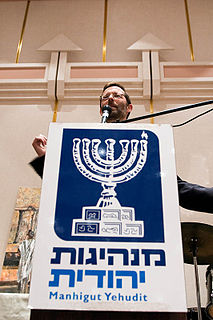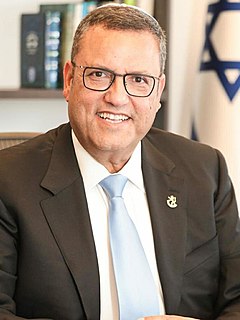| | ||||||||||||||||
| ||||||||||||||||
| Turnout | 50.4% | |||||||||||||||
|---|---|---|---|---|---|---|---|---|---|---|---|---|---|---|---|---|
| ||||||||||||||||
| ||||||||||||||||
| Part of a series on the |
 |
|---|
An election for the leadership of Likud was held on 31 January 2012.
| | ||||||||||||||||
| ||||||||||||||||
| Turnout | 50.4% | |||||||||||||||
|---|---|---|---|---|---|---|---|---|---|---|---|---|---|---|---|---|
| ||||||||||||||||
| ||||||||||||||||
| Part of a series on the |
 |
|---|
An election for the leadership of Likud was held on 31 January 2012.
Incumbent Benjamin Netanyahu was expected from the beginning, failing a political crisis to run for re-election. Silvan Shalom and Moshe Feiglin were touted as potential candidates to oppose Netanyahu. However, Shalom declined to run. [1] On 29 December 2011, Feiglin announced his candidacy. [2]
Declined
Other
Feiglin wishes to restore Jewish values and fight secularism and socialism. He wants to end all US aid to Israel and cancel the Oslo Accords. He accused Netanyahu of lying about Jewish settlement in the West Bank. [2] Feiglin has worked to rally support from Likud voters in the West Bank, warning that Netanyahu will "turn left" and freeze construction again. Feiglin hopes to get at least 20% in the primaries, although he received 24% during the last primaries. Netanyahu has said to his campaign that Feiglin must not get over 20%. [4]
Feiglin was mentioned by supporters of Ron Paul, a candidate for the Republican nomination for President of the United States, responding to claims that Paul is anti-Israel due to his opposition to foreign aid. Feiglin refused to endorse any candidate, saying he does not like when Americans interfere in Israeli politics. However, he said he agrees with Ron Paul on foreign aid, and with Newt Gingrich on the historical status of Palestinians. [5]
He said Israel should have attacked Iran's nuclear program long ago, and that would be his first act in office. [1]
On 3 January 2012, Feiglin launched his campaign with hundreds of supporters at the Ramada Renaissance Hotel in Jerusalem, and outlined his platform. He would "keep the entire Land of Israel, build throughout the land, expel enemies and infiltrators, and go up to the Temple Mount to sacrifice the Paschal Lamb". In addition, he would appoint a Likud defense minister, criticizing Netanyahu for maintaining former Labor leader Ehud Barak, properly equip soldiers for missions, demand that [U.S. President] Obama release Jonathan Pollard, and prevent a Meretz take-over of the Supreme Court. Supporters were encouraged to promote the candidacy of Feiglin and convince Likud voters to vote for him. [6]
A poll released on 16 January 2012 by Ma’agar Mochot showed Netanyahu leading Feiglin 51% to 35%, with 14% of Likud members undecided. [7]
Netanyahu defeated Feiglin, winning 77% of the vote. Feiglin's campaign accused Netanyahu supporters of preventing voters from voting. Analysts have said that Netanyahu's inability to win 80% is a failure. [8]
In addition, serious allegations of vote-fixing were raised, indicating that Feiglin may have won a significantly higher percentage of the vote. [9] These allegations were never followed up with a formal complaint, as they would not have resulted in a victory for Feiglin.
| Poll | Date | Netanyahu | Feiglin | Undecided |
|---|---|---|---|---|
| Ma’agar Mochot [10] | 16 January 2012 | 51% | 35% | 14% |
Turnout stood at 50.4% [11]
| Candidate | Votes | Percentage |
|---|---|---|
| Benjamin Netanyahu | ~48,490 | 76.79% |
| Moshe Feiglin | ~14,660 | 23.21% |
Likud, officially known as Likud – National Liberal Movement, is a major centre-right to right-wing political party in Israel. It was founded in 1973 by Menachem Begin and Ariel Sharon in an alliance with several right-wing parties. Likud's landslide victory in the 1977 elections was a major turning point in the country's political history, marking the first time the left had lost power. In addition, it was the first time in Israel that a right-wing party won the plurality of the votes. After ruling the country for most of the 1980s, the party lost the Knesset election in 1992. Likud's candidate Benjamin Netanyahu won the vote for Prime Minister in 1996 and was given the task of forming a government after the 1996 elections. Netanyahu's government fell apart after a vote of no confidence, which led to elections being called in 1999 and Likud losing power to the One Israel coalition led by Ehud Barak.

Moshe Zalman Feiglin is an Israeli politician and activist, and the leader of libertarian Zionist party Zehut. A former member of Likud, he headed the Manhigut Yehudit faction within the party, and represented Likud in the Knesset between 2013 and 2015.

Manhigut Yehudit is a movement started by Moshe Feiglin and Shmuel Sackett to lead the State of Israel with, in their words, "authentic Jewish values". This has been widely interpreted, both by Manhigut supporters and outside observers, as Orthodox Judaism, but without a Galut or Exile Mentality. The movement opposes religious and secular coercion, and wants Jewish identity, as prescribed by the Tanakh or Bible, and authentic Jewish teachings to become Israel's official culture.

Kadima was a centrist and liberal political party in Israel. It was established on 24 November 2005 by moderates from Likud largely following the implementation of Ariel Sharon's unilateral disengagement plan in August 2005, and was soon joined by like-minded Labor politicians.

Elections for the 18th Knesset were held in Israel on 10 February 2009. These elections became necessary due to the resignation of Prime Minister Ehud Olmert as leader of the Kadima party, and the failure of his successor, Tzipi Livni, to form a coalition government. Had Olmert remained in office or had Livni formed a coalition government, the elections would have been scheduled for 2010 instead.

The Jewish Home is an Orthodox Jewish and religious Zionist political party in Israel. It was originally formed by a merger of the National Religious Party, Moledet, and Tkuma in November 2008. However, Moledet broke away from the party after its top representative was placed only 17th on the new party's list for the 2009 Knesset elections, and instead ran on a joint list with Hatikva. Tkuma later also left to join the National Union.
Early elections for the nineteenth Knesset were held in Israel on 22 January 2013. Public debate over the Tal Law had nearly led to early elections in 2012, but they were aborted at the last moment after Kadima briefly joined the government. The elections were later called in early October 2012 after failure to agree on the budget for the 2013 fiscal year.
An election for the leadership of Kadima was held on 27 March 2012, pitting Tzipi Livni against Shaul Mofaz. Mofaz won with 62% of the vote.

Early elections for the twentieth Knesset were held in Israel on 17 March 2015. Disagreements within the governing coalition, particularly over the budget and a "Jewish state" proposal, led to the dissolution of the government in December 2014. The Labor Party and Hatnuah formed a coalition, called Zionist Union, with the hope of defeating the Likud party, which had led the previous governing coalition along with Yisrael Beiteinu, Yesh Atid, The Jewish Home, and Hatnuah.

Indirect presidential elections were held in Israel on 10 June 2014. The result was a victory for Reuven Rivlin of the Likud party. Rivlin was sworn in as President of Israel on 24 July.

A leadership election was held by the Likud party on 31 December 2014. It was won by incumbent Prime Minister and leader of Likud Benjamin Netanyahu.
Early legislative elections were held in Israel on 9 April 2019 to elect the 120 members of the 21st Knesset. Elections had been due in November 2019, but were brought forward following a dispute between members of the current government over a bill on national service for the ultra-Orthodox population, as well as impending corruption charges against incumbent Prime Minister Benjamin Netanyahu.

Zehut was a right-libertarian and nationalist political party in Israel founded in 2015 by Moshe Feiglin. Its platform was centered around promoting individual liberty, including economic freedom, and annexing the West Bank. The party also advocated for legalization of cannabis.
Snap legislative elections were held in Israel on 17 September 2019 to elect the 120 members of the 22nd Knesset. Following the previous elections in April, incumbent Prime Minister Benjamin Netanyahu failed to form a governing coalition for a second consecutive time. On 30 May, the Knesset voted to dissolve itself and trigger new elections, in order to prevent Blue and White party leader Benny Gantz from being appointed Prime Minister-designate. This election marked the first time the Knesset voted to dissolve itself before a government had been formed.

The New Right is a right-wing political party in Israel, established in December 2018 by Ayelet Shaked and Naftali Bennett. The New Right aims to be a right-wing party open to both religious and secular people. The party did not win any seats in the April 2019 election, though it won three seats in the subsequent election of September 2019, retained these in the March 2020 election and increased to seven seats in the 2021 Israeli legislative election. It is currently the sole member of the Yamina alliance.
Legislative elections were held in Israel on 2 March 2020 to elect members of the twenty-third Knesset. The result was initially a stalemate, which was resolved when Likud and Blue & White reached a coalition agreement. Under the terms of the agreement, the premiership would rotate between Benjamin Netanyahu and Benny Gantz, with Gantz given the new position of Alternate Prime Minister until November 2021. These elections followed continued political deadlock after the April and September 2019 Knesset elections.
Legislative elections were held in Israel on 23 March 2021 to elect the 120 members of the 24th Knesset. It was the fourth election in two years. Yair Lapid and Naftali Bennett announced that they had formed a rotation government on 2 June 2021, which was approved on 13 June 2021.

The 2018 Jerusalem mayoral election was held on 30 October and 13 November 2018 to elect the mayor of Jerusalem.

A leadership election was held by the Likud party on 15 August 2007. Incumbent Benjamin Netanyahu defeated challengers Moshe Feiglin and Danny Danon by a large majority.
A leadership election was held by the Likud party on 19 December 2005. former Prime Minister and Party Leader Benjamin Netanyahu defeated Deputy Prime Minister and Minister of Foreign Affairs Silvan Shalom, as well as candidates Moshe Feiglin and Israel Katz.